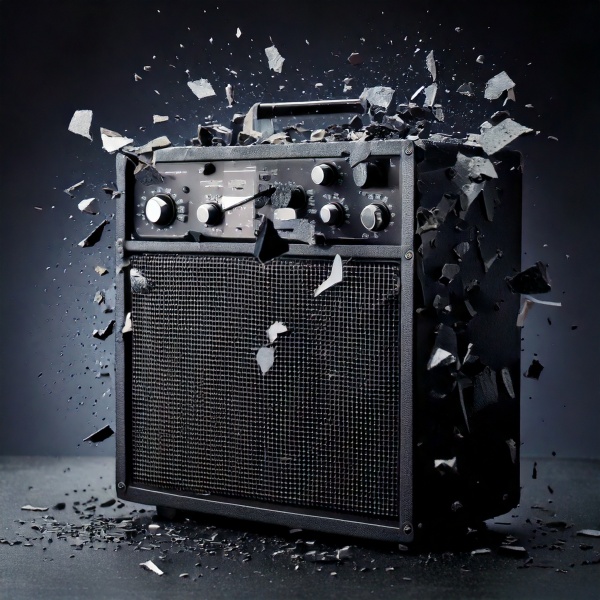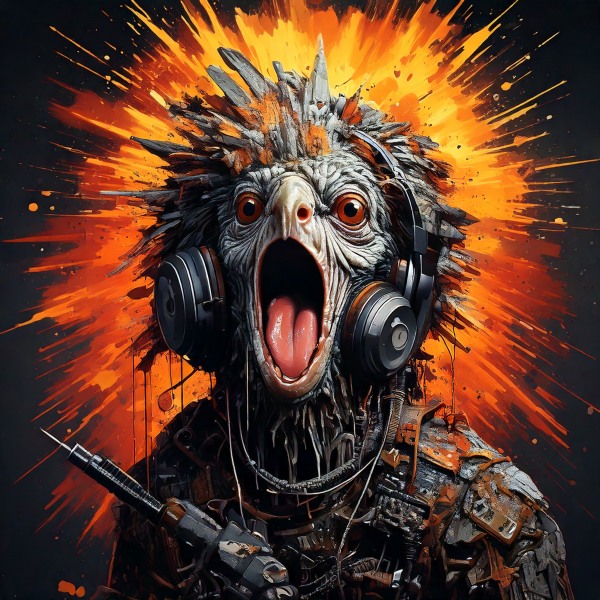Introduction: What Is Noise Rock?
Noise rock is a genre that thrives on distortion, dissonance, and defiance. Born at the intersection of punk rebellion, experimental chaos, and industrial grit, noise rock emerged in the late 1970s as an artistic response to polished mainstream sounds. It strips rock down to its rawest elements, then rebuilds it with screeching feedback, jagged rhythms, and an often confrontational aesthetic.
But noise rock isn’t just loud — it’s deliberate. Behind the chaos lies intention: a refusal to conform, a desire to push sonic boundaries, and a challenge to how we define music itself. From underground basements to critically acclaimed albums, the genre has influenced generations of musicians who crave raw emotion and sonic experimentation.
Today, noise rock continues to resonate with artists and listeners drawn to its untamed spirit. Whether in the early work of pioneers like Sonic Youth or the abrasive energy of modern acts like METZ, noise rock remains a visceral, relevant force in alternative and experimental music.
A Brief History of Noise Rock
The story of noise rock begins in the late 1970s and early 1980s, as punk’s raw energy gave way to a thirst for something even more abrasive and boundary-breaking. Early noise rock bands like Sonic Youth, Swans, and Big Black paved the way, blending punk’s urgency with avant-garde experimentation, heavy distortion, and industrial noise. These trailblazers created not just a new sound, but a new attitude—loud, unpolished, and fiercely independent.
As the genre grew through the 1990s and 2000s, it found a home in underground venues, lo-fi recording setups, and independent labels. Noise rock artists like The Jesus Lizard, Unsane, and Shellac pushed the envelope further, infusing their sound with math rock precision, hardcore punk aggression, and brutal honesty.
Noise rock’s DIY ethos and anti-mainstream stance made it deeply influential beyond its own scene. It shaped the jagged textures of grunge, the sprawling dynamics of post-rock, and even the dreamy distortion of shoegaze. Today, its fingerprints can still be found across countless subgenres, proving that noise, when wielded right, becomes an art form.
Key Characteristics of Noise Rock

At its core, noise rock is defined by chaos—but it’s a calculated kind of chaos. Unlike traditional rock, which often relies on melody and structure, noise rock bands thrive on dissonance, feedback, and extreme distortion. Guitars squeal and roar, drums crash with abandon, and vocals can range from whispered tension to guttural screams.
But there’s more to noise rock than just pure aggression. Many noise rock artists build entire soundscapes, balancing harsh textures with unexpected moments of calm or atmosphere. Song structures are often deconstructed, abandoning typical verse-chorus patterns in favor of sprawling, unpredictable compositions.
This deliberate clash between intensity and introspection is what gives noise rock its depth. It may sound abrasive on the surface, but behind the wall of sound lies purpose, experimentation, and an emotional core. It’s this raw honesty and boundary-pushing spirit that keeps the genre vital—even decades after its inception.
Best Noise Rock Bands That Defined the Genre
The noise rock scene has birthed some of the most daring and uncompromising acts in music history. From its gritty underground beginnings to modern experimental hybrids, these noise rock bands have pushed boundaries and redefined what rock can be.
🧨 Classic Pioneers
- Sonic Youth introduced avant-garde textures into punk, blending art rock with blistering distortion.
- Big Black, led by Steve Albini, delivered raw, industrial-strength soundscapes.
- The Jesus Lizard perfected the blend of chaos and tight musicianship, influencing countless others.
🌪️ Experimental Legends
- Swans evolved from abrasive no wave roots into apocalyptic sonic journeys.
- Japan’s Boredoms brought psychedelic chaos into the mix, while Melt-Banana fused speed, noise, and surrealism into an unclassifiable sound.
⚡ Modern Torchbearers
- Daughters shifted from grindcore to lush, terrifying sound design.
- METZ channels early ’90s energy with pounding, fuzz-drenched anthems.
- Lightning Bolt creates seismic, drum-and-bass-driven walls of noise with only two members.
And while not traditionally filed under noise rock, Bush deserves a shoutout. Their raw production, gritty tones, and emotionally charged delivery land them on my personal top 100 list on Spotify—proving how fluid genre lines can be when it comes to influence and sonic impact.
Whether you’re diving into the classics or exploring the fringes, these are some of the best noise rock bands worth your attention.
🎸 Essential and Best Noise Rock Albums to Hear Before You Die
The world of noise rock albums is diverse, from groundbreaking classics to modern gems that push the genre into new territories. These essential releases are not just a reflection of the genre but also a testament to its power and lasting influence. If you want to understand noise rock at its core, these albums are the perfect starting point.
🎧 Top Noise Rock Albums
- “Daydream Nation” – Sonic Youth
Arguably the defining album of the genre, Daydream Nation blends chaos with beauty, crafting expansive soundscapes that influenced not just noise rock bands but entire alternative scenes. - “Songs About Fucking” – Big Black
A brutal, industrial-tinged masterpiece that combines noise rock with punk and post-punk, pushing Steve Albini’s signature raw sound to new extremes. - “You’re a Woman, I’m a Machine” – Death from Above 1979
With a mix of heavy bass riffs and ferocious drumming, this album showcases noise rock‘s potential for explosive energy, even with a minimalist two-piece setup. - “Children of God” – Swans
A dark, sonic odyssey that merges post-punk with industrial and noise rock, Children of God is as much a spiritual journey as it is an auditory assault. - “Boredoms – Super Æ”
A chaotic, psychedelic masterpiece by the Boredoms that deconstructs rhythm, melody, and form with feverish intensity and creativity.
🎤 Underrated Gems and Modern Releases
- “A New Wave of Noise” – Lightning Bolt
Thunderous and relentless, this album exemplifies noise rock’s power as Lightning Bolt pushes the boundaries of the genre with two instruments, raw distortion, and a sense of urgency. - “Sick Mouthy” – Daughters
A crucial modern noise rock album, Daughters’ Sick Mouthy mixes post-punk with noise rock, weaving together abrasive textures and unsettling melodies for a mesmerizing listen. - “VII” – METZ
METZ’ third studio album continues to capture the raw aggression of noise rock, filled with dissonance, loud guitars, and a frenetic pace that leaves no room for subtlety. - “Genghis Tron – Board Up the House”
This album brings a unique twist, blending noise rock with elements of electronica and metal, and is a true example of genre fusion that still maintains a solid noise rock foundation. - “Exploding Head” – A Place to Bury Strangers
Often described as “the loudest band in New York,” Exploding Head is an onslaught of fuzz, feedback, and distortion—a modern noise rock classic.
Whether you’re just starting your noise rock journey or looking to dive deeper into its more obscure corners, these best noise rock albums are essential listening to understand the genre’s evolution and the unrelenting intensity that defines it.
🔮 Noise Rock Today: The Genre’s Influence and Future
While noise rock might have originated in the late 70s and early 80s, its impact is far from over. As it continues to evolve, it influences not just underground scenes but also mainstream artists. Today, noise rock still resonates through modern music, paving the way for a new generation of musicians while keeping its roots alive in underground movements. Here’s a look at how noise rock continues to shape the music world and what the future holds.
🌍 Noise Rock’s Influence on Other Genres
Noise rock has been instrumental in shaping the direction of several modern genres, particularly those that challenge traditional song structures and embrace dissonance and experimentation.
- Math Rock: The complexity and angularity of noise rock directly influenced math rock, which features intricate, polyrhythmic structures. Bands like Don Caballero and Battles carry forward the chaotic, unorthodox approach to rhythm and melody.
- Post-Punk Revival: The relentless energy of noise rock has also bled into the post-punk revival, evident in bands like The White Stripes and Yeah Yeah Yeahs, who incorporate fuzz, distortion, and aggressive tones reminiscent of noise rock bands from the early days.
- Noise Pop: With a fusion of melody and chaos, noise rock influenced noise pop, a genre that marries the abrasive sounds of noise rock with more accessible, catchy melodies. Bands like Sonic Youth and My Bloody Valentine were pioneers in this cross-genre blending.
🎤 Influence on Indie and Mainstream Acts
Today, noise rock is not confined to obscure, underground scenes. Its influence is palpable in the music of both indie and mainstream acts who take cues from the raw, aggressive energy of early noise rock bands.
- Indie Acts: Modern indie acts like Sleaford Mods, Idles, and Protomartyr have taken inspiration from noise rock, incorporating its dissonant tones and abrasive feedback into their own distinctive sounds. These bands create music that channels the rebellious spirit of noise rock while appealing to a new generation.
- Mainstream Acts: Even mainstream artists such as Jack White and The Black Keys have drawn influence from noise rock’s DIY aesthetic, channeling its raw energy into their compositions. The sonic textures of noise rock are often found beneath the surface of mainstream hits, especially in heavier rock music.
👀 Upcoming Bands to Watch
While the noise rock genre continues to inspire, there are still plenty of up-and-coming bands that are pushing its boundaries and keeping the spirit of noise rock alive.
- Sonic Jesus: A newer addition to the scene, Sonic Jesus combines elements of psych rock and noise rock, offering intense, hypnotic atmospheres with heavy, distorted guitars.
- Fawn Spots: This up-and-coming band is infusing noise rock with a post-punk twist, creating dissonant, atmospheric tracks that challenge traditional rock structures.
- Dinosaur Pile-Up: While more on the grunge side, this band incorporates heavy doses of noise rock through their sludgy guitars and feedback, bringing a contemporary take on noise rock’s gritty aesthetics.
🔄 Revival Trends in Underground Scenes
Noise rock remains a vital part of the underground music scene. With growing interest in experimental music, there has been a resurgence of noise rock bands that stay true to the genre’s roots. These underground acts carry on the tradition of noise rock while exploring fresh sounds and techniques.
- DIY Venues and Tape Culture: Many underground noise rock artists still release their music on limited cassette tapes, continuing the genre’s roots in the DIY culture. This grassroots movement ensures that the noise rock spirit stays authentic and underground.
- Noise Rock Collectives: New collectives and labels have emerged, continuing the noise rock legacy and bringing together like-minded bands that embrace non-conventional music production methods and sound experimentation.
As noise rock continues to evolve, its influence can be heard in a wide range of genres, from post-punk to experimental metal, and it remains a driving force in the underground music scene. With new artists emerging, the future of noise rock promises more noise, more chaos, and more exploration of the boundaries of sound.

🎧 Why Noise Rock Still Matters
Noise rock is more than just a genre; it’s a visceral experience that transcends conventional music structures. Its influence has spanned decades and continues to fuel creative expression in music today. Here’s why noise rock still matters and why you should dive into its chaotic world.
🎨 Artistic Value and Cultural Relevance
At its core, noise rock is about pushing boundaries—both sonically and artistically. It’s a genre that rejects commercialism in favor of raw, untamed creativity. The sonic aggression, dissonance, and experimental structures are not just about noise for the sake of noise; they are deeply connected to the expression of emotion, rebellion, and a desire to break free from tradition. It’s a genre that embodies the struggle for artistic freedom and cultural authenticity.
Whether it’s the feedback-laden guitars of Sonic Youth, the industrial grind of Swans, or the gritty aggression of Big Black, noise rock continues to reflect the struggles of artists seeking to make their voices heard in a world that often demands conformity.
⚡ Emotional Power
Despite its abrasive nature, noise rock is incredibly emotional. It might not be immediately accessible to all listeners, but once you immerse yourself in its layers of sound, the chaotic and often jarring qualities begin to speak to you on a deeper level. The dissonant tones, unexpected shifts in tempo, and relentless energy create an emotional rollercoaster that taps into the rawest human feelings—anger, frustration, euphoria, and catharsis.
The energy in noise rock is palpable and often feels like a release from the overwhelming chaos of life. It’s music that doesn’t shy away from discomfort, but instead embraces it, making it a powerful and relatable form of artistic expression.
💥 Invitation to Dive Deeper
For those who haven’t yet experienced noise rock, it might seem intimidating at first. The harsh sounds and unconventional structures can be overwhelming, but it’s precisely this rawness that makes the genre so compelling. Whether you’re a fan of experimental music or simply looking for something that challenges the status quo, noise rock is an invitation to explore music in a completely new way.
Don’t be afraid to dig deep into the genre, even if you’re not an avid fan of heavy music. Artists like Sonic Youth, The Jesus Lizard, and Melt-Banana offer entry points into a world of sonic experimentation that will expand your musical horizons. Each album, each band, each track has something new to offer, often revealing layers of meaning upon each listen.
🔥 The Chaos Is Worth It
Ultimately, noise rock is about embracing the chaos, and that’s why it still matters today. It’s not neat, it’s not polished, and it’s certainly not for everyone. But for those who are willing to listen closely, noise rock offers a raw, unfiltered experience that’s unlike anything else in music. The genre might not always be easy to digest, but it’s a testament to the power of music as a force for artistic expression and emotional release.
So, if you’ve yet to explore the best noise rock albums or discover your favorite noise rock bands, now is the time. Let the chaos sweep over you, and you may just find yourself captivated by the beauty in the noise.

